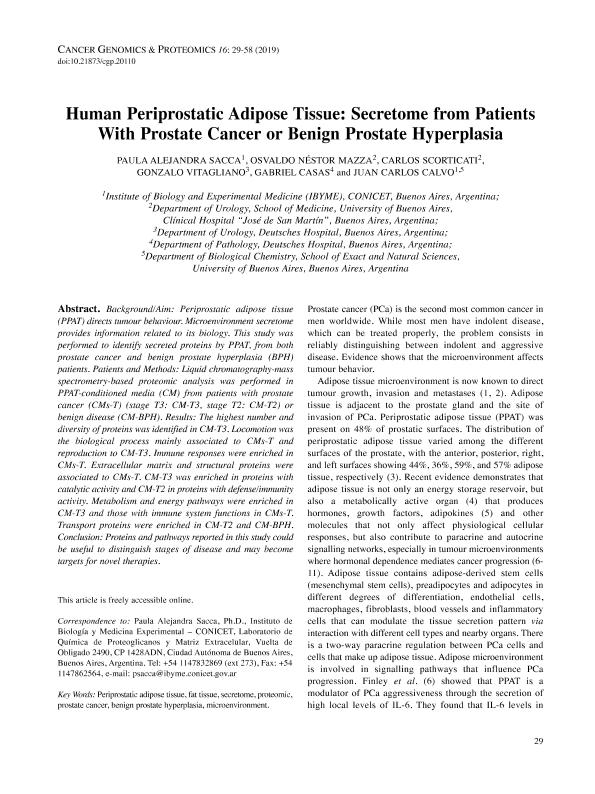Artículo
Human periprostatic adipose tissue: Secretome from patients with prostate cancer or benign prostate hyperplasia
Sacca, Paula Alejandra ; Mazza, Osvaldo Néstor; Scorticati, Carlos; Vitagliano, Gonzalo; Casas, Gabriel; Calvo, Juan Carlos
; Mazza, Osvaldo Néstor; Scorticati, Carlos; Vitagliano, Gonzalo; Casas, Gabriel; Calvo, Juan Carlos
 ; Mazza, Osvaldo Néstor; Scorticati, Carlos; Vitagliano, Gonzalo; Casas, Gabriel; Calvo, Juan Carlos
; Mazza, Osvaldo Néstor; Scorticati, Carlos; Vitagliano, Gonzalo; Casas, Gabriel; Calvo, Juan Carlos
Fecha de publicación:
01/2019
Editorial:
International Institute of Anticancer Research
Revista:
Cancer Genomics & Proteomics
ISSN:
1790-6245
Idioma:
Inglés
Tipo de recurso:
Artículo publicado
Clasificación temática:
Resumen
Periprostatic adipose tissue (PPAT) directs tumour behaviour. Microenvironment secretome provides information related to its biology. This study was performed to identify secreted proteins by PPAT, from both prostate cancer and benign prostate hyperplasia (BPH) patients. Liquid chromatography-mass spectrometry-based proteomic analysis was performed in PPAT-conditioned media (CM) from patients with prostate cancer (CMs-T) (stage T3: CM-T3, stage T2: CM-T2) or benign disease (CM-BPH). The highest number and diversity of proteins was identified in CM-T3. Locomotion was the biological process mainly associated to CMs-T and reproduction to CM-T3. Immune responses were enriched in CMs-T. Extracellular matrix and structural proteins were associated to CMs-T. CM-T3 was enriched in proteins with catalytic activity and CM-T2 in proteins with defense/immunity activity. Metabolism and energy pathways were enriched in CM-T3 and those with immune system functions in CMs-T. Transport proteins were enriched in CM-T2 and CM-BPH. Proteins and pathways reported in this study could be useful to distinguish stages of disease and may become targets for novel therapies.
Archivos asociados
Licencia
Identificadores
Colecciones
Articulos(IBYME)
Articulos de INST.DE BIOLOGIA Y MEDICINA EXPERIMENTAL (I)
Articulos de INST.DE BIOLOGIA Y MEDICINA EXPERIMENTAL (I)
Citación
Sacca, Paula Alejandra; Mazza, Osvaldo Néstor; Scorticati, Carlos; Vitagliano, Gonzalo; Casas, Gabriel; et al.; Human periprostatic adipose tissue: Secretome from patients with prostate cancer or benign prostate hyperplasia; International Institute of Anticancer Research; Cancer Genomics & Proteomics; 16; 1; 1-2019; 29-58
Compartir
Altmétricas



